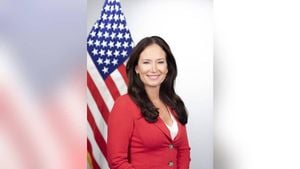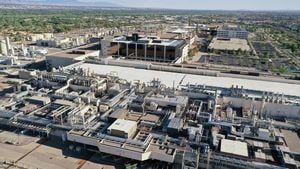World leaders are gathering for COP29, the United Nations Climate Change Conference, taking place in Baku, Azerbaijan, amid tensions and differing opinions on how to tackle global warming. This year's conference is especially significant, as it aims to increase funding for poorer nations to help them cope with the challenges posed by climate change, which is fast becoming one of the defining issues of our time.
The stakes have never been higher. A recent report from the Global Carbon Project has revealed alarming news: carbon dioxide emissions from oil, gas, and coal have surged to new heights, raising urgent questions about how we can fulfill our commitment to the Paris Agreement's goal of limiting global warming to 1.5 degrees Celsius. The research indicates we may need to reach net-zero emissions by the late 2030s, decades earlier than previously thought.
At the heart of COP29 is the call for increased climate finance. Developing nations are pushing for richer countries to commit at least $1.3 trillion annually to help them transition to cleaner energy and develop strategies for climate adaptation. Currently, wealthier nations are only contributing about $100 billion each year, which is nowhere near enough to meet the needs of those most affected by climate impacts.
Among the leaders attending COP29, there are stark contrasts. Italian Prime Minister Giorgia Meloni called for a pragmatic approach to decarbonization, cautioning against rapid transitions to green energy without considering the economic realities of energy demand driven by population growth. She remarked, “Currently there is no single alternative to fossil fuel supply,” which reflects concerns over how quickly nations can shift their energy sources without harming their economies.
At the same time, leaders from climate-vulnerable nations like Tuvalu are sounding alarm bells. “There is simply no time to waste,” declared Tuvalu's Prime Minister Feleti Penitala Teo, emphasizing the urgent need for comprehensive commitments to phase out fossil fuels and accelerate the move to renewable energy sources. His words serve as a reminder of the immediate dangers faced by countries already experiencing the devastating effects of climate change, such as rising sea levels and extreme weather events.
The discussions at COP29 have also been critically focused on the financial commitments made by developed countries. The Prime Minister of the Bahamas, Philip Davis, shared his frustrations, noting how small island nations have spent significantly more on debt repayments compared to what they have received in climate financing. He stated, “The world has found the ability to finance wars, the ability to mobilize against pandemics. Yet when itcomes to addressing the most severe crisis of our time, where is the same ability?” His remarks spotlight the disparity between financial resources allocated for military and pandemic responses versus those for climate action.
Azerbaijan's President Ilham Aliyev, presiding over this year's event, defended his country's oil and gas industry against Western criticism. He described Azerbaijan as being subject to a “well-orchestrated campaign of slander and blackmail,” clearly unhappy with how Western nations have criticized his country's energy policies. The president acknowledged the need for addressing climate issues but insisted there must be real-life pragmatism, arguing against blaming countries for their fossil fuel resources.
This clash between nations with abundant fossil fuel resources and those bearing the brunt of climate impacts creates a complicated backdrop for negotiations. Many believe the West has been hypocritical, continuing to rely heavily on fossil fuels even as they demand others transition to cleaner alternatives. Yet, leaders like U.N. Secretary-General Antonio Guterres have rejected the notion of balancing fossil fuel use with environmental commitments, asserting, “Doubling down on fossil fuels was absurd.”
Seeking clarity and accountability, Guterres emphasized during his address, “The world must pay up, or humanity will pay the price.” He underscored the urgency of increasing financial support to poorer nations, with development lenders like the World Bank under pressure to do more. Observers hope this summit will lead to actionable outcomes, especially as scientists warn of increasing climate-related disasters
Back home, many Americans are grappling with the effects of climate changes themselves, with wildfires sweeping through California, prompting evacuations and filling air quality alerts. Elsewhere, extreme weather is wreaking havoc, with regions like Spain experiencing unprecedented flooding. Prime Minister Mia Mottley of Barbados encapsulated the sentiments at COP29, saying, “These extreme weather events… suggest we’re hurtling toward catastrophe.”
With discussions progressing, leaders are expressing varying degrees of optimism and skepticism about achieving substantial progress at COP29. Negotiators have presented drafts aimed at addressing the funding gaps and outlining how nations can come together to combat climate change effectively. Yet, the voices for urgent action from vulnerable countries echo louder than ever.
It’s still uncertain what firm agreements will emerge from this gathering, but it's clear the issues at stake cannot be ignored. The negotiations continue, with the hopes of millions relying on world leaders to break the deadlock and forge paths toward sustainable futures.



